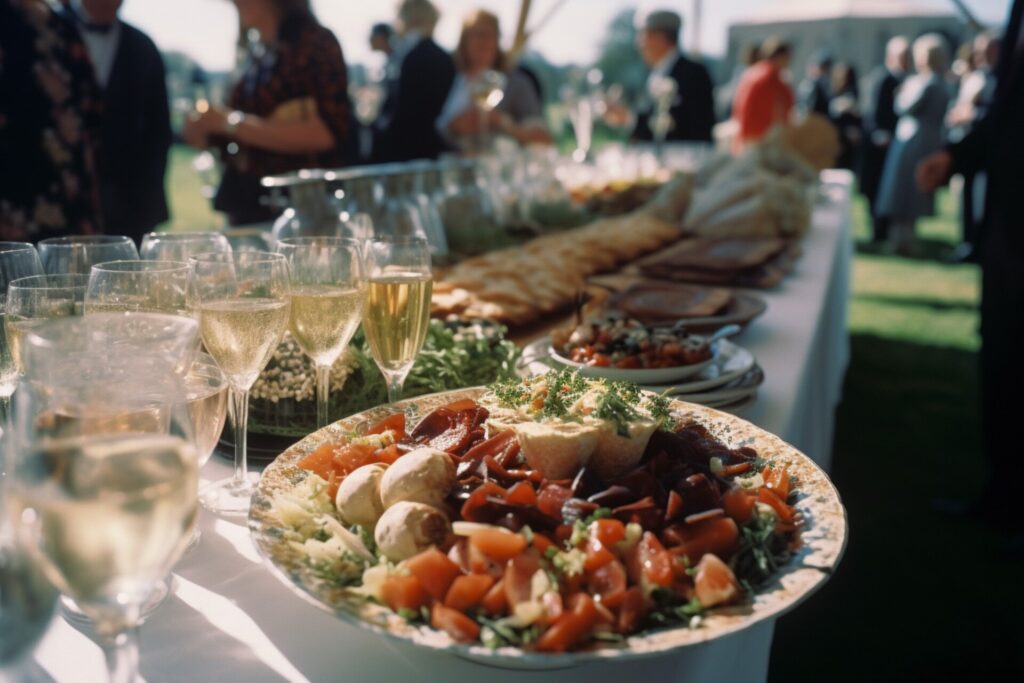How to Find a Wedding Caterer Last Minute
Start by contacting local catering companies and asking about cancellations or open dates – many keep waitlists. Explore restaurants that offer drop-off catering, as they often have more flexibility than traditional wedding caterers. Check gig economy platforms like Thumbtack or Craigslist for freelance chefs. Simplify your menu to buffet or family-style service, which requires less staffing. Finally, tap into local wedding Facebook groups – vendors often post last-minute availability there.
The panic usually arrives late at night, when the to-do list is already too long and the calendar seems far too short. Food, of all things, is the last detail anyone expects to slip through the cracks. It’s the centerpiece of the reception, the anchor that brings everyone together, the part of the night that keeps guests comfortable and happy. So when you realize that your caterer is no longer an option or that you never locked someone in at all, it feels like disaster. It isn’t. Not yet. Couples manage this exact crisis every year and still create weddings where guests leave raving about the food. What matters is how you approach the search and how you handle the stress.
The first truth to hold on to is that weddings are not judged by the menu printed on paper. Guests won’t compare what you serve to the five-course plated meal from someone else’s celebration. They’re not looking for proof that you’ve planned the perfect event. They’re hungry, they’re there to toast you, and they want food that fills them and makes them feel welcome. That perspective changes everything. It allows you to look past the rigid idea of what a wedding dinner “has” to be and opens you up to what can still be arranged quickly.
Restaurants are one of the strongest lifelines in this kind of situation. Most already cook for large crowds and many are used to preparing food for private events or parties. With a bit of notice they can scale that service into something that works beautifully for a wedding. They may bring trays or pans of food, or they may even provide staff to set up and serve. The point is that they already have the infrastructure to feed people in numbers. It doesn’t matter if their website doesn’t say “wedding catering.” Pick up the phone, tell them what you need, and you might be surprised at the solutions they offer.
There’s also a kind of charm in serving food from a place you already love. Maybe it’s the restaurant where you had your first date, or the one you visit every year for an anniversary dinner. Sharing those flavors with your guests makes the meal feel personal. People will taste it and you’ll have a story to tell: “We’ve been coming here for years and wanted you all to enjoy it too.” That sense of authenticity often lands more deeply than the most elaborate plated dish.
If restaurants are booked solid, there are still paths forward. Caterers do have cancellations. Events shift or get postponed, and suddenly there’s an opening. Most companies don’t shout these changes from the rooftops, but if you call directly and explain your date, you may catch one of those windows. Persistence is everything here. One no doesn’t mean they all will be no. The phone calls add up, and sometimes the last one you make is the one that solves the entire problem.
While the search is happening, it helps to release the vision of a complicated menu. Keep it simple. A few strong dishes, served generously, can carry a wedding meal. Guests rarely notice if there are fewer options, but they notice if the food runs out or arrives cold. Focus on quality, focus on timing, and let go of the idea that you need endless variety. Couples who accept this shift often find themselves enjoying the reception more, because they’re not worried about details nobody else is watching.
Community networks, both online and off, are another overlooked resource. In local wedding groups, vendors frequently post about last-minute availability. Other couples share names of people who saved the day for them. Sometimes a freelance chef or a small team looking to fill an open weekend will offer exactly what you need. It may feel informal compared to a glossy website, but the work can be every bit as good. In fact, many of the most memorable meals come from smaller operations that treat your wedding with personal care because they value the opportunity.
Desserts can also be a saving grace. If the main meal ends up simpler than you imagined, a strong dessert table can elevate the night and leave guests talking. Local bakeries are used to quick turnaround orders. Cupcakes, pies, cookies, pastries – those can be arranged in days, not months. Spread across a long table with coffee and a little late-night bubbly, the display feels abundant and celebratory. Guests remember the sweetness, not the fact that it wasn’t the cake you once planned.
Some couples worry that piecing food together from different places will look sloppy. It doesn’t. With the right coordination, it feels like variety. One vendor handles the entrées, another provides dessert, and someone else covers appetizers. To guests it reads as intentional. Behind the scenes it’s just practicality. The only trick is to set clear delivery times and make sure someone is managing the flow. A planner, a coordinator, or even a trusted friend can step into that role.
What matters more than the source of the food is the way it’s presented. Even simple meals look refined when displayed thoughtfully. Serving pieces, clean table settings, and a bit of décor tie everything together. Rental companies often provide what you need with very little notice, and many restaurants have chafing dishes or platters they’ll lend. The guests don’t know whether those touches were arranged months in advance or days. They just see a spread that looks cared for, and that’s all that matters.
It’s natural in a moment like this to think you’ve failed, that your wedding will never feel the way you hoped. That’s the stress talking. Once food is secured, even if it isn’t the first plan, the relief is immediate. Couples who’ve been through it say the same thing: after locking in catering, they were able to return to the real purpose of the day. Vows, music, family, joy – those are the parts people remember. The scramble becomes a story you laugh about, not the thing that defines your wedding.
There’s also something freeing about realizing that weddings don’t have to follow one template. A plated dinner with multiple courses might impress on paper, but a buffet with hearty favorites or a station setup with comfort food often creates a more relaxed, connected atmosphere. Guests mingle, they share, they talk. They go back for seconds without hesitation. That energy is what makes a reception feel alive. In the end, the meal that came together under pressure may end up being the one that created the exact mood you wanted all along.
Money is often a concern with last-minute arrangements, and understandably so. But flexibility can actually save money instead of costing more. Restaurants price differently than caterers. Simple menus require less staff. Short-notice deals sometimes pop up when vendors would rather work than leave a date empty. The assumption that late booking always means higher cost isn’t always true. It depends on where you look and how willing you are to pivot.
It helps to remember that food is more than fuel at a wedding. It’s hospitality. It’s a way of saying thank you to the people who came to share in your commitment. However it arrives – through a restaurant delivery, a team of freelance chefs, or a traditional caterer who just happened to have an opening – it carries that meaning. Guests don’t measure it against a checklist. They feel it in the atmosphere.
So if you’re staring at the calendar and wondering how it will all come together, take heart. Weddings are resilient. People are adaptable. Food will be there, and when it arrives, it will do what it always does: bring everyone to the table, quiet the hunger, and spark conversations that last late into the night. And when you look back, you won’t remember the frantic search. You’ll remember the faces around you, the laughter, the clinking of glasses, and the fact that somehow, against the odds, everything came together.


